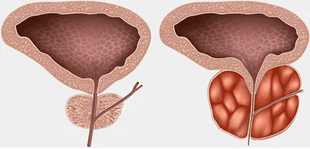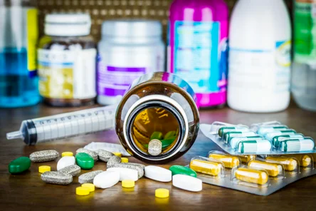
Drug therapy is most often prescribed for the treatment of prostatitis. During its passage, the patient must take different categories of medications. Some are designed to eliminate the symptoms that cause discomfort, while others deliberately act directly on the affected gland, eliminating the most important thing - the root cause. However, medications differ in the strength of the effect, as some are aimed at the acute while others are chronic. Let’s take a look at the most popular medications used to treat prostatitis.
Types of drugs used to treat prostatitis
All medicines prescribed by your doctor can be divided into several categories according to the method of administration:
- Tablets and capsules- when taken orally, the body is moderately absorbed, in the case of capsules absorption is much faster, as all components reach their destination after a short time the gelatinous shell dissolvesafter.
- Injections- can be both liquid and powdered preparations, which are then diluted in a working fluid, usually anesthetic, given intramuscularly or intravenously, and the effect is noticeable after a few minutes. . . . rectal suppositories (suppositories) and absorbed.
- Instillations- a group of drugs that have a maximum positive effect only if they directly enter the area of the prostate gland concerned, the method is used in a hospital setting because the introduction is made through the urethra.
- Microcrystals- These usually include non-drug medications, such as herbal decoctions, they are not a substitute for drug therapy, but can be good treatments for pain relief or prevention.

It is worth noting that certain types of medicines can be sold in several forms at the same time, such as tablets and suppositories, so your doctor should indicate this property without failure.
Top drugs for treating prostatitis
Medication for prostatitis is a rather complicated procedure in which the physician must select the appropriate medications that not only relieve the pain and eliminate other symptoms associated with the manifestations, but also help eliminate the underlying cause of the disease. The disease itself can be of different origins, manifest itself in acute or chronic form, and cause a wide range of discomfort to the patient, limiting him or her both in natural affairs and leading to complete infertility.
Classic tablets, intramuscular injections and rectal suppositories can be used to treat prostatitis. The choice of drug depends directly on whether its ingredients need to be delivered urgently to the affected organ.
Additional tools
The treatment of prostatitis is not limited to listing multiple drugs. Professionals may use other types of different categories of drugs.
Fluoroquinolones
Fluoroquinolones are antibacterial drugs used to treat the tuberculous origin of prostatitis. These funds are used in a complex way and the patient can be prescribed treatment with four or more drugs at the same time.
Cephalosporins
Cephalosporins are antimicrobial drugs that target specific types of bacteria.
Such drugs can also have a broad and directed spectrum of action, and the need for this or that treatment depends directly on the form of the disease and the cause of its occurrence.
Macrolides
Macrolides are rarely used to treat prostatitis because they are used to fight certain types of bacteria, such as mycoplasma and chlamydia. By the way, a disease like chlamydia is often associated with prostatitis, so doctors prescribe several tests at once to identify problems with the prostate gland at an early stage.
In acute manifestations of prostatitis, your doctor may prescribe several different categories of medicines at the same time. This approach allows you to effectively treat both the symptoms and the disease itself.
Analgesics
The vast majority of analgesics are prescribed in the presence of acute pain syndrome, which is an organic companion to chronic but more commonly exacerbated prostatitis. The use of drugs in this group is not strictly recommended outside the framework of drug therapy to eradicate the disease, as the body becomes accustomed to them quickly and will need to increase the dose to achieve an analgesic effect, which may adversely affect the liver and kidneys. The course of analgesics is prescribed individually.
Alpha blockers and muscle relaxants
The main tasks of these groups of drugs are to relieve tension in the bladder muscles of the bladder, urethra and reduce pelvic pressure. These therapies help to get rid of the discomfort and normalize the urination process.
Immunomodulators
Such preparations contain essentially natural ingredients, in the case of prostatitis - extracts based on the tissues of the prostate gland of cattle. Regardless of the drug, they all have a common principle of action that allows:
- slows down the course of inflammatory processes;
- increases the tone of smooth muscle and bladder walls;
- to minimize blood clot formation;
- improves prostate blood circulation;
- reduces the amount of prostate.
In addition, such resources are actively used for preventive purposes, which helps to prevent the occurrence or relapse of the disease.
Vitamins and supplements
Devices in these categories can reduce inflammation, improve fluid drainage, and get rid of congestion. The demand for such drugs is also due to insufficient intake of nutritious nutrients, especially during antibiotic therapy.
Prostatitis is a fairly complex disease that can only be treated by a true professional. Self-choice of drugs is strictly not recommended, as this approach increases the likelihood of complications in the form of infertility, impotence, and even increases the risk of developing cancer. Medications used for prostatitis without consultation with a doctor can make it impossible to get rid of the disease without surgery. In addition, self-medication is complicated by the impossibility of making an accurate diagnosis, as this requires adequate equipment and knowledge.
It should also be recalled that most drugs used to treat prostatitis are quite toxic and some types are simply incompatible. If you feel pain in the pelvic area while urinating, defecating, or ejaculating, go to the toilet often and you cannot empty your bladder normally, do not risk it - see your doctor. In this way, you will not only prevent the unfavorable course of the disease, but you will also be able to avoid the development of the chronic form with which you have to live your whole life. In addition, sexual functions are not impaired, and with timely treatment, you can give birth to completely normal and healthy offspring.
























